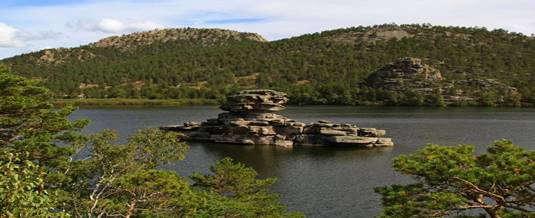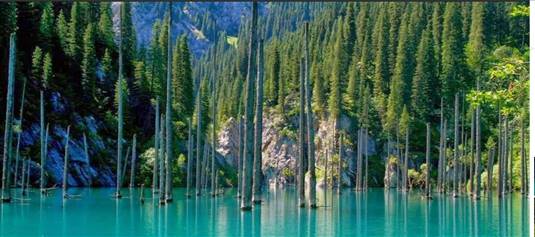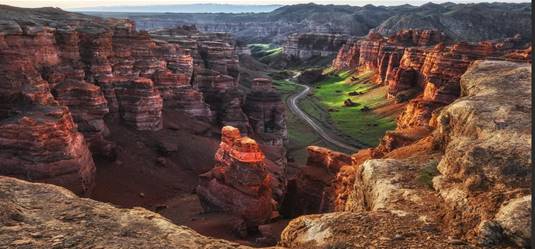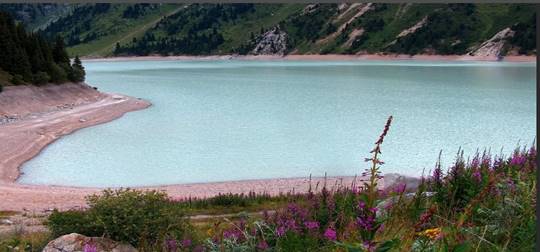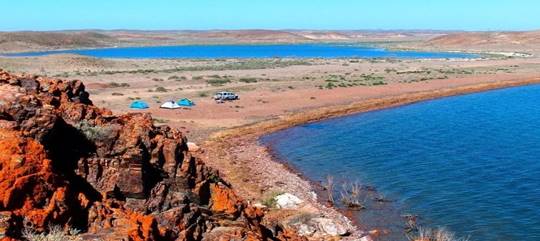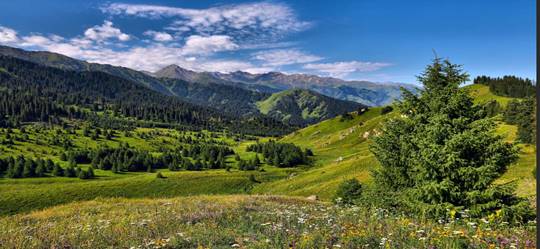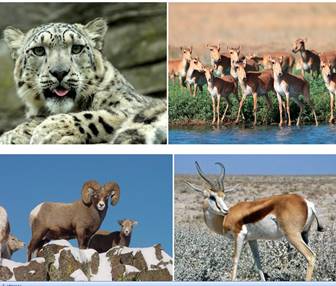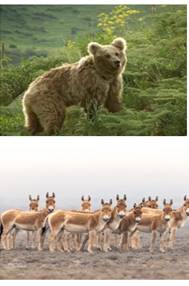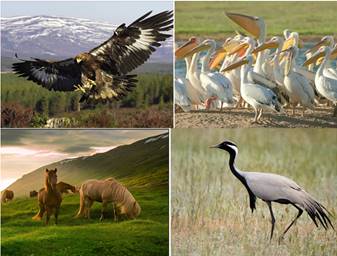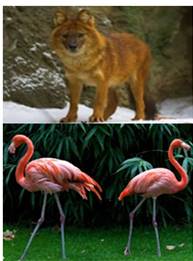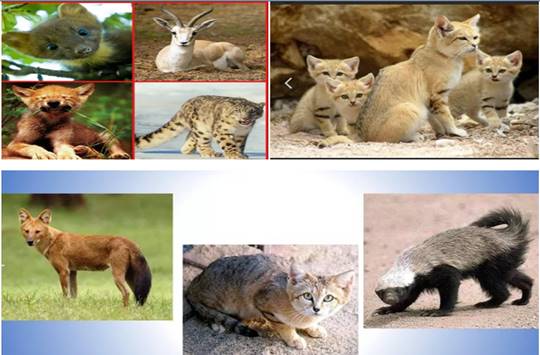Lesson objectives
·
to revise the new vocabulary
·
to use the vocabulary in phrases and
sentences
·
to speak about flora and fauna of
Kazakhstan
T:I. Answer the questions:
What
beautiful places of the world do you know?
What
beautiful places of Kazakhstan do you know?
Ss answer
II. Find the meanings of the words
1. species
1.
2. wildlife
2.
3. insects
3.
4.flora
4.
5.fauna
a.
a. animals, birds and plants that live in natural conditions
b.
b. all the plants that grow in a particular area
c.
c. all the animals that live in a particular area
d.
d. small animals that have six legs and often have wings
e.
e. a plant or animal group whose members all have similar
general features
III. You
see two columns of words. Match the words to make up word expressions.
global
flowers
endangered change
garden
warming
climate
environment
protect reserves
nature
animals
volunteering
programme
IV Flora of Kazakhstan
Students share information
about flora of Kazakhstan:
Kazakhstan is an amazing country which
many people call «a museum under the sky». It is situated in Middle Asia and
known for its numerous natural landmarks. Some of them are: Lake Burabai, Lake
Kaindy, Charyn canyon, Lake Tengiz, Lake Balkhash, Zailiyskiy Alatay and
others. Kazakhstan can be divided into 3 zones: steppes, semi-deserts and
deserts, The steppes of the North Kazakhstan are characterized by feather
grass. In the North there are birch and pine forests, especially on the sands
near the Irtysh river and the Tobol river. The semi-deserts are characterized
by different types of wormwood, the deserts – by grass, subshrub and saxaul.
The lakes are usually surrounded by reed. At the foothills bushes grow
(dogrose, honeysuckle, barberry). In the mountains of Zailisky Alatau we can
find wild apple tree, hawthorn. In the centre there are
coniferous forests.
Lake Burabai
Lake Kaindy
Charyn
canyon
Lake Tengiz
Lake Balkhash
Zailiyskiy Alatay
V. Fauna of Kazakhstan
Students share information
about fauna of Kazakhstan:
The wildlife of Kazakhstan is varied
too. There are 155 species of mammals. Most of them are rodents, gophers and
hamsters in the steppes, sanderlings in the deserts, water rats near the
water. Field- vole, jerboa, hare can be found everywhere. There are hoofed
animals: saiga, dzheiran in the deserts, maral, musk deer in the lowlands. In
the mountains wild boar, roe can be met. In the forests of Altai and Tian
Shan – brown bear, snow leopard, sguirrel dwell, wolf, fox.
There are 480 species of birds in Kazakhstan. Many of them are water fowl,
grey goose, wild duck. Lake Tengiz is famous for its flamingo.
There are 49 species of reptile and 11 species of amphibian. There
are tortoises, lizards and snakes in the plane.
VI. Let’s speak about endangered
animals, that are in the Red Book. Tell about them.
Students share information about Endangered Animals in
Kazakhstan.
Endangered animals: Turkestan lynx,
argali, kulan, graycrane, caiga, snow leopard, black rhino, great white
shark, blue whale, giant panda and others.
Every year the number of endangered species steadily grows. It
would be good to define what the community of endangered species is. It is a
population of organisms which is at risk of becoming extinct. More than 40
percent of all organisms are likely to become extinct soon, which is
unbelievable. Some of them are simply few in numbers, some are threatened by
changing environment. In most cases animal extinction, as well as other
natural calamities, is a result of human actions. Many habitats are being
destroyed around the world. It seems that endangered wildlife is everywhere
around us. To think only that these cute little polar bears at the zoo are
gradually going to become extinct. Human activity has strong influence on the
process of animal extinction. People chop down numerous forests, leaving
certain species without shelter and their natural habitat.
Conclusion: We should protect the nature and animals of our
land.
Descriptor:
Learner
- answers the questions
- finds the meanings of
the words - matches the words to make up word
expressions - tells information about fauna and
flora of Kazakhstan - tells information about Endangered
Animals in Kazakhstan
Term 3
Module 6 «The natural world»
School: № 8
Date:____22.02.2019
Teacher’s name: Olga Smirnova
Grade 8 ”Ә”
Number present:
Number absent:
Theme of the lesson:
“Environmentalism.
Nature rules”
Learning objectives(s)
that this lesson is contributing to
8.1.3.1- respect
differing points of view;
8.4.6.1-recognise
the attitude or opinion of the writer on a growing range of unfamiliar
general and curricular topics, including some extended text
8.1.10.1- use talk or
writing as a means of reflecting on and exploring a range of perspectives on
the world
8.3.3.1-
give an opinion at discourse level on a wide range of general and curricular
topics
8.1.7.1- develop and
sustain a consistent argument when speaking or writing;
Lesson objectives
All learners
will be able to:
—
Pronounce
and name types
of rare animals, people’s activities
—
Recognize
and use expressions of Passive voice.
Most learners will be able to:
·
Answer
the questions and make sentences about environmentalism and humans’
activities
·
Do
exercises with expression
of their own opinions about theme
Some learners will be able to:
·
Speak
fluently about the Natural World and humans’ activities to protect areas of
natural beauty
Value links
Being environmentally conscious/friendly, actively providing
solutions to global problems.
Cross curricular links
Ecology
Previous
learning
Previously
learned vocabulary on the topic «The Natural world».
Use of ICT
Smart
board for showing a presentation, getting additional information, playing the
audio files.
Intercultural
awareness
Accept
the diversity of the things that people do protecting the Nature all over the
world
Health and
Safety
Breaks and
physical activities used.
Plan
Planned
timings
Planned
activities
Resources
Main
Activities
Feedback
Assessment
I.
The
lesson greeting.
Good morning ,
boys and girls.
My name is Olga
Valentinovna Smirnova and I am your teacher of English for today.
Teacher divide students into some teams(parts of word
combinations)
Ok, let’s begin
II.
Brainstorming.
Start
thinking
1) Look at the
paper
You should put
the words under the correct category: deer, bluebells, flamingo, wild garlic
,squirrel, eagle, lynx, elk, moss, lichen, red-necked wallabies, pelicans,
cranes.
|
Mammals |
Birds |
Plants |
|
Deer Squirrel Lynx Elk red-necked |
Flamingo Eagle Pelicans Cranes |
wild lichen Moss |
So, tell me please about our today’s theme
It
will be…(“The natural world”),yes and “Environmentalism. Nature rules”
(The teacher with a help of students sets the lesson objectives,
letting students know what to anticipate from the lesson.
2) Let’s remember the
rules of the lesson
3)Your
next task
Open
your Student’s Book on page 74
So,
you see ex 1
Let’s
read the sentences and decide in pairs which reasons to protect areas of
natural beauty are important and explain why.
Check
each other.
3) And now let’s do
ex 2,p 74. Do the quiz
Answers:
1)
True 3) True 5) False
2)
false 4) False (east) 6) True
4) Look at the
screen, you can see the video
Now let’s read
Think please
Which words and phrases tell you how the author feels?
5) Please, look at
the ex5,p and at my list
Answer , please,
the world around us is getting better or worse?
You
work in pairs(groups). What can you say about your classmates?
He(she)
was active/passive
Summarizing
Change
works and check each other
WB
SB+presentation
Worksheets
SB
SB+video+worksheets
Ending
the lesson
Help others/did not help
Understood everything/part of the lesson
6) And now, tell me
some words about our lesson
to speak about Environmentalism.
NOW
I ——KNOW HOW to understand information
_____CAN to say my opinion
to express my attitude
to find necessary information
III.
You
can see the rules of synkvein, so try to make your own one
I
have my synkvein about holiday
Now
it’s time for assessment
Please
tell me what was easy for you and what was hard
Feedback: Teacher asks learners what task was difficult to them and
which pair worked well.
Thank
you for the lesson
Your
home work will be ex 1(b), p 74
Good-bye.
See you
Worksheet
Worksheet
End
1min
Feedback:
Teacher asks students what task was difficult to them and which pair worked
well.
Additional
information
Differentiation
–
how do you plan
to give more support? How do you plan to challenge the more able learners?
Assessment –
how are you
planning to check learners’ learning?
Critical
thinking
Differentiation
can be achieved through the selection of activities, identification of
learning outcomes for a certain student, provision of individual support to
learners, selection of learning materials and resources based on the
individual abilities of learners.
Assessment
criteria:
1.
Apply
topic related vocabulary in speech appropriately arranging words and phrases
into well-formed sentences;
2.
Apply the correct quantifiers including will, to be going to, the Present
Continuous tense in the context.
Descriptor:
A
learner:
· uses the topical
vocabulary while talking about Natural world and Environmentalism and
activities completes the task with proper quantifiers.
·
Observation
·
Feedback
on the work
·
Self-assessment
Students
think
critically, exploring, developing, evaluating and making choices about their
own and others’ ideas
Дата публикации:
23.01.2021 20:42
Продолжительность:
03:12
Ссылка:
https://thewikihow.com/video_JCox3ZcxSBk
Действия:
Источник:
Описание
Подписывайтесь на наш Telegram канал!@thewikihowоткрытьМониторим видео тренды 24/7
Explore more videos from Айымжан Тугелбаева — Free English Lessons
Фото обложки и кадры из видео
Excel 8Th Grade. Module 6. The Natural World. Flowers 23.01.2021, Айымжан Тугелбаева — Free English Lessons
https://thewikihow.com/video_JCox3ZcxSBk
Аналитика просмотров видео на канале Айымжан Тугелбаева — Free English Lessons
Гистограмма просмотров видео «Excel 8Th Grade. Module 6. The Natural World. Flowers 23.01.2021» в сравнении с последними загруженными видео.
Теги:
Английский Язык
English Lessons
English For Kids
School
Похожие видео
08:38
1 958 773 просмотра.
02:46
7 860 459 просмотров.
00:31
1 217 390 просмотров.
01:03:41
370 603 просмотра.
00:58
2 935 991 просмотр.
25:59
376 202 просмотра.
31:28
991 578 просмотров.
03:22
489 966 просмотров.
14:55
2 715 058 просмотров.
After they have found their partners, students read the descriptions in pairs using dictionaries if necessary. Tell learners to make a note of all the new words they come across in their vocabulary notebooks. But first ask them which words are important to write as new ones to their minds, and only then you can add some words from the list:
Steppe — степь
desert – пустыня
semi-desert полупустыня
lake — озеро
pine forests – сосновые леса
birch groves – березовые рощи
wildlife — wild rams, djeyrans, golden eagles, and balaban falcons — дикая жизнь — архар, джейраны, беркуты, и балабан соколы.
antelopes, saigas — антилопы, сайгаки
National Preserve — Национальный заповедник
Reservoir – резервуар, водохранилище
Picturesque – живописный, mountainous- горный
forest, , meadow — лес, луг
the natural memorial — природный музей
shrub, shrubbery —кустарник
arid -сухой
wetlands — водно-болотные угодья
swamps болота
vegetation — растительность
taiga- тайга
glaciers — ледники
As the continuation of this activity each pair is given a map of KZ with no names to put the labels on it, and then discuss which areas they have been to
- Akmola
- Aktyube
- Almaty
- Atyrau
- Karaganda
- Kostanai
- Kyzylorda
- Mangistau
- Pavlodar
- North Kazakhstan
- East Kazakhstan
- South Kazakhstan
- West Kazakhstan
- Zhambyl
In ppt you can show the real map of KZ with names to check their answers, add any information they know about the place. Learners then write a short description of approximately 10 – 15 words for each area based on the description given, but in their own words. Monitor and offer support, giving learners plenty of timе (here you may mention about the 8W8 objective to achieve)
Reading and speaking
First ask if learners know what world heritage sites (Объекты всемирного наследия) are and if they know any examples. Let them write the definition in their copybooks.
World heritage site is a natural or man-made site, area, or structure recognized as being of outstanding international importance and therefore as deserving special protection. Sites are nominated to and designated by the World Heritage Convention (an organization of UNESCO).
Ask if learners are familiar with Google Earth and Google Street View
If learners are not familiar with this, take the time to show them
Before you show the video, ask them to think about what the man believes is important about world heritage sites. Show the video of world heritage sites which uses Google Street View (see learning resources) to help people all over the world view world heritage sites.
Learners
- watch the videos
- comment on what they see.
Show the next 8R6 objective in ppt and success criteria to achieve it
Homework: to learn new words by heart, use them in making up questions to the content of the video they have watched
Excel 8 Module 6 P67 Ex8 Listening The Great Sphinx
01:47
2.35 MB
4.4K
EXCEL 8 Module 6 A Carpet Of Colour
01:59
2.61 MB
1.8K
Excel 8 Module 6 P69 Ex7 Listening Dialogue
01:51
2.43 MB
4.5K
EXCEL 8 Module 6 The Red Panda
01:51
2.43 MB
2.2K
Excel 8th Grade Module 6 The Natural World Flowers
03:12
4.21 MB
6.3K
Excel 8 Module 6 P63 Flowers Vocabulary
32
718.75 KB
1.8K
Excel 8 Module 6 P68 Places Of Natural Beauty
01:33
2.04 MB
5K
Excel 8 Grade Module 6f Tree Parts And Functions Части дерева и их функции на английском
03:21
4.41 MB
3K
EXCEL 8 Module 6 Tree Parts And Functions
01:48
2.37 MB
1.9K
Excel 8 Grade Module 6 The Natural World Flowers
01:22
1.80 MB
3.2K
Excel 8 Module 6f Ex 2 P 72
02:37
3.44 MB
1.9K
Excel 6 Module 8 P89 Ex5 Listening
47
1.03 MB
4.5K
Places Of Natural Beauty Text Excel 8 Module 6
02:23
3.14 MB
1.9K
Excel 8 Module 6 P 68 Vocabulary
01:52
2.46 MB
652
Excel 8 Module 6 P65 Ex3 Endangered Animals Vocabulary
22
494.14 KB
2.2K
Excel 8 Module 6 Nature Rules
02:20
3.07 MB
1.5K
The Red Panda Vocabulary Excel 8 Module 6
39
875.98 KB
2.4K
Places Of Natural Beauty Vocabulary Excel 8 Module 6c
33
741.21 KB
2K
Excel 8 Module 6 Tree Parts And Functions P 72
01:35
2.08 MB
564
Excel 7 Module 6 P71 Ex1 Listening
02:48
3.68 MB
8K
Excel 8 Module 8 P93 Ex6 The Omarov Family
57
1.25 MB
5.4K
EXCEL 8 For Kaz M6c Ex 7 P 69 Listen Choose
01:47
2.35 MB
1.4K
EXCEL Grade 8 Module 6d Ex 1 Text
01:02
1.36 MB
727
Excel 8 Module 6 Nature Reserves Around The World Text P 71
02:48
3.68 MB
423
Excel 8 Module 6 Suggesting Agreeing Disagreeing P 69
01:03
1.38 MB
443
Excel 6 Module 8 P93 Ex5 Listening
01:51
2.43 MB
4.2K
Excel 6 Module 8 Our Neighbourhood P 87
54
1.18 MB
3.4K
Excel 8 Module 6 Nature Reserves Around The World
01:48
2.37 MB
1.8K
Excel 7 Module 6 P73 The Flash
01:29
1.95 MB
1K
Excel 8 Module 6 Listening The Great Sphinx Ex 8 P 67
01:47
2.35 MB
525
Excel 5 Module 4 Ex 8 P 51
01:08
1.49 MB
1.4K
Excel 7 Module 6 P67 Ex7 Listening
01:58
2.59 MB
4.3K
Excel 5 Module 8 P105 Ex6 Listening
31
696.29 KB
7.2K
Excel 5 Module 6 P84 Ex4 Fairies In The Wood
01:24
1.84 MB
3.9K
Excel 6 Module 6 P75 Ex2 Listening Astana Baiterek
01:08
1.49 MB
1.4K
Excel Module 6a Project 1a City Of Honu Point
28:31
37.53 MB
822
Excel 6 Module 8 P88 Twin Cities Text Ver
02:42
3.55 MB
1.8K
Nauryz Vocabulary Excel 9 Module 6c
34
763.67 KB
2.1K
Excel 8 Module 6 The Red Panda
02:07
2.79 MB
1.2K
Excel 5 Module 8 P105 Ex6 Listening
31
696.29 KB
649
Excel 7 Module 6 P69 Ex5 Listening
54
1.18 MB
5.6K
Excel 7 Module 6 Feel The Rhythm
02:17
3.01 MB
3.8K
Excel 7 Module 6 P65 Ex 7 Listening Jane Steve Susan About Films
01:11
1.56 MB
3.2K
Excel 7 Module 8 P93 Ex4 Listening
02:01
2.65 MB
10.8K
Excel 8 Grade Module 6 A Endangered Animals
01:21
1.78 MB
1.6K
Excel 9 Module 6 P68 Ex6 Listening
01:11
1.56 MB
3.3K
Excel 6 Module 7 P82 Ex1 The Grove Of The Dancing Birches Video Ver
02:00
2.63 MB
4.9K
Excel 6 M 6 Ex 5 P 71
01:42
2.24 MB
1.7K
EXCEL 8 For Kaz M8c Ex 6 P 93 The Omarov Family
59
1.29 MB
1.8K
Excel 7 Module 8 P89 Ex8 Listening
51
1.12 MB
5.4K

